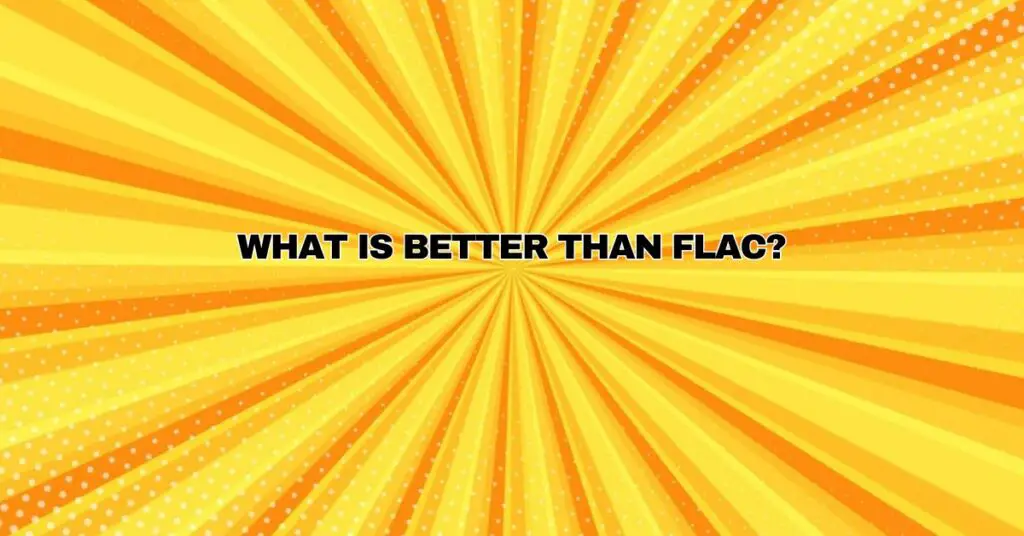For decades, audio enthusiasts have been on a quest to achieve the highest possible sound quality from their music collections. Audiophiles are particularly discerning when it comes to audio formats, always searching for the ultimate solution to preserve and reproduce their favorite tracks with the utmost fidelity. FLAC, or Free Lossless Audio Codec, has long been the gold standard in the world of lossless audio compression. But is there something better than FLAC? In this article, we’ll dive deep into the world of high-fidelity audio formats, exploring the pros and cons of FLAC and some alternatives that audiophiles are turning to.
The FLAC Advantage
FLAC is a widely accepted and well-regarded audio format, primarily because of its lossless compression. It allows you to compress audio files without any loss in quality, making it the preferred choice for audiophiles who want to preserve the original audio data in their music collection. The compression ratios in FLAC are typically around 50%, which means it reduces file size without sacrificing audio quality.
The format is also versatile, supporting high-resolution audio, multi-channel audio, and even metadata like album artwork and song information. FLAC is an open-source format, and this, combined with its compatibility with most media players and devices, has made it the go-to choice for audiophiles and digital music archivists.
FLAC’s primary advantages are:
- Lossless Compression: FLAC is designed to be a lossless codec, meaning it compresses audio files without losing any quality, making it perfect for preserving music collections in their original form.
- Open Source: Being open source, FLAC is freely available and supported by a wide range of software and hardware, ensuring its long-term viability.
- High-Resolution Audio Support: FLAC can handle high-resolution audio files, which is crucial for audiophiles who want the best possible sound quality.
- Metadata Support: FLAC allows users to embed metadata, including album art, artist, and track information, making it an attractive option for music archivists.
Are There Better Alternatives?
While FLAC is an exceptional choice for audiophiles, it’s always worth exploring alternative formats that may offer unique features or advantages. Here are a few alternatives to consider:
- ALAC (Apple Lossless Audio Codec):
- Developed by Apple, ALAC is another lossless audio codec that offers similar quality to FLAC. It is particularly well-suited for Apple users as it integrates seamlessly with iTunes and Apple devices.
- One downside is that it is not as widely supported as FLAC in non-Apple software and hardware.
- WAV (Waveform Audio File Format):
- WAV is a completely uncompressed audio format, making it a bit-perfect representation of the original audio source. This means there’s no loss of quality during compression.
- The main drawback of WAV is that it produces very large files, which may not be ideal for portable music players or limited storage space.
- DSD (Direct Stream Digital):
- DSD is an alternative audio format often used for high-resolution audio. It uses a different approach to digital audio encoding, which some audiophiles believe offers superior sound quality.
- However, DSD files are significantly larger than FLAC, and not all equipment and software support this format.
- MQA (Master Quality Authenticated):
- MQA is a format designed for streaming high-quality audio. It combines lossless compression with a “studio master” quality approach, and it’s known for its efficient size and excellent audio quality.
- The limitation with MQA is that it requires specialized hardware and software to fully take advantage of its features.
- AIFF (Audio Interchange File Format):
- AIFF is a lossless audio format that is often preferred by Mac users. It’s compatible with a variety of media players and supports high-resolution audio.
- Like WAV, AIFF produces large files, which may be a concern for those with limited storage.
Conclusion
FLAC remains a robust and versatile choice for audiophiles, providing lossless compression and wide compatibility. However, there are several alternative formats, each with its unique features and advantages. The choice of the best format depends on individual preferences, hardware, and specific use cases.
When exploring audio formats, it’s crucial to consider factors such as storage space, compatibility with your devices and software, and personal preferences for sound quality. Ultimately, what is “better” than FLAC is subjective, and the best format for you is the one that best suits your audiophile needs and preferences. Whether you stick with FLAC or opt for an alternative format, the pursuit of audio perfection continues to be a thrilling journey for enthusiasts dedicated to superior sound quality.

